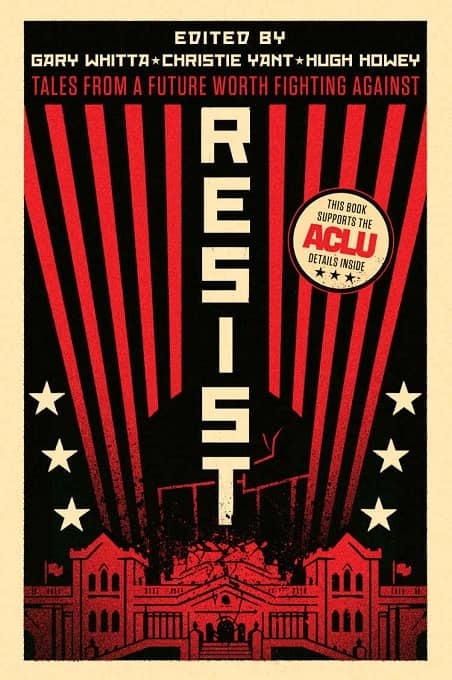In 500 Words or Less: Two New Anthologies! New Suns and Resist
 |
 |
New Suns: Original Speculative Fiction by People of Color
Edited by Nisi Shawl
Solaris (384 pages, $15.99 paperback, March 2019)
Resist: Tales from a Future Worth Fighting Against
Edited by Gary Whitta, Christie Yant and Hugh Howey
Independently published (386 pages, $14.99 paperback, $7.99 eBook, October 19, 2018)
I’ve never been a fan of predictions about the time we live in, especially if they’re grandiose, but damn if someone doesn’t claim decades from now that today was a new golden age of SFF, especially in short fiction. Sure, there’s still a lot of the same generic crap being published (for some reason), but simultaneously there’s so much compelling, engaging work coming out that I can’t keep up.
Take, for example, New Suns: Original Speculative Fiction by People of Color, edited by Nisi Shawl. A few of the names I recognized in here, but so many of them I had never heard of before, which I imagine is part of the point. “Harvest” by Rebecca Roanhorse is dark and delicate as it explores a relationship between a chef and a supernatural being called the “deer woman.” Jaymee Goh’s “The Freedom of the Shifting Sea” provides soft undertones about industrial development and environmental destruction, while Tobias S. Buckell doesn’t mince any of that with his depiction of an Earth bulldozed by aliens looking for resorts and tourist traps in “The Galactic Tourist Industrial Complex.” But the one that really blew me away was Minsoo Kang’s “The Virtue of Unfaithful Translations,” written as a treatise about a painting that tells the tale of a peace treaty concocted by two translators. I’m not sure that sounds captivating, but I promise you, it is.
Editors Gary Whitta, Christie Yant and Hugh Howey take a different focus with Resist: Tales from a Future Worth Fighting Against, an anthology that doesn’t try to hide its purpose, with half its sales going to the ACLU. Being honest, some of the stories in here try to hit you over the head with their messages, but more of them are subtle and captivating. Charlie Jane Anders’ “Horatius and Clodia” is told from the perspective of a currency AI designed to replace money and prevent theft, weapons purchasing, etc., which falls in love with a virus designed to fight it. For John Scalzi, it’s starship AI trying to stop an interstellar war in “The Tale of the Wicked.” Someone I’d never read before is Sarah Kuhn, and her story “Monster Queens” is a fun character piece with these phenomenally dark undertones, about two pageant contestants trapped in a never-ending show after aliens conquer Earth.
I’ll admit that I feel like I’m seeing too much pop culture try to subtly comment on the state of things in the West (The Lego Movie 2’s message of “everything isn’t awesome, but don’t lose hope” was a little heavy-handed) but it’s anthologies like these that are doing things right. We don’t need mainstream films bandwagoning; we need editors and publishers showcasing more diverse, talented writers that operate around themes like racial equality and protection of freedom, in ways that are nuanced and compelling and entertaining. That’s how we get a golden age of SFF. Not that I’m predicting anything, of course.
An Ottawa teacher by day, Brandon has been published in On Spec, Pulp Literature, Electric Athenaeum, and elsewhere. Check out his latest short story “Exactly What You Need,” about a magical bookstore misused by a grieving mother, in the latest issue of Abyss & Apex. You can also follow Brandon at brandoncrilly.wordpress.com or on Twitter: @B_Crilly.
What happened to the comments? Did a flame war happen while I was away?
No flames at all, James. Perhaps just a preemptive watering to prevent any from igniting.
Probably my fault – maybe my comment was considered unacceptably snarky (though I didn’t think so, of course), but by any reasonable standard, yours was certainly inoffensive.
Well, well.